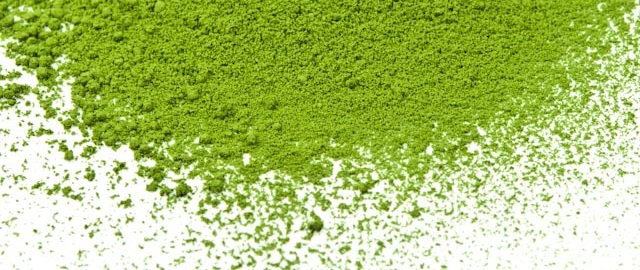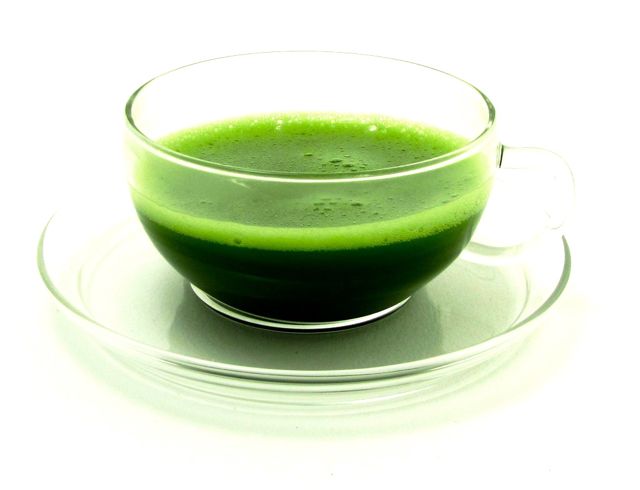Health Benefits

Organic Japanese Matcha is Recommended By Doctors. Dr King explains why virtually everybody ought to be drinking Organic Japanese Matcha every day.
1. What are the health benefits of matcha green tea? Why should I consider buying matcha green tea instead of other teas such as regular green tea or black tea?
- Matcha is an excellent superfood. It has a high density of antioxidants. One cup of matcha green tea is equivalent to many cups of regular green tea (in terms of antioxidants and some other valuable nutrients). Research at the University of Colorado at Colorado Springs, USA, indicates that JAPANESE MATCHA GREEN TEA contains 137 times the EGCG (epigallocatechin-3-gallate) antioxidants of a popular green tea called China Green Tips Green Tea (which is currently sold by Starbucks®, the famous coffee shop chain in the UK and USA) (Weiss et al., 2003). Matcha green tea also contains far more antioxidants than regular black tea.
- EGCG is a potent antioxidant. Many leading doctors and researchers believe that antioxidants are important in helping protect cells, DNA and other molecules in the body from damaging free radicals, which are a cause of many diseases. Currently, one of the theories to help explain many diseases [such as many types of cancer, stroke and cardiovascular disease (including angina and myocardial infarction which is commonly called a ‘heart attack’)] is the "Free Radical Theory of Disease". Therefore, I believe that drinking Organic Japanese Matcha Green Tea every day, as part of a healthy lifestyle, will help protect against many diseases.
- Through various mechanisms, Matcha green tea helps protect against many common diseases such as many types of cancer, stroke, cardiovasular disease (e.g. 'heart attacks' and 'angina'), hypercholesterolaema ('high cholesterol'), hypertension ('high blood pressure'), Alzheimer's disease, Parkinson's disease and type 2 diabetes. References are available on request.
- Matcha Green Tea helps relax the mind due to high levels of L-theanine (a special amino acid). Doctors refer to stressful situations as 'stressors'. Stressors are risk factors for many health problems. For example, stressors are a potent risk factor for heart attacks and high blood pressure. Therefore, in my opinion, drinking matcha green tea on a daily basis should help protect against heart attacks, high blood pressure and other stressor-linked diseases. L-Theanine has many other benefits e.g. it increases concentration without inducing anxiety.
- Matcha Green Tea helps with weight loss. A study showed that drinking matcha green tea regularly increases the speed of metabolism. Matcha green tea decreases fat absorption, increases fat breakdown and decreases the speed at which fat is made in the body. Matcha green tea has 3 Calories per serving, which is lower than most, if not all, superfoods. It is virtually fat-free and sugar-free. Drinking tea helps you feel fuller. Therefore, matcha green tea is definitely advantageous (as part of a healthy lifestyle) if you wish to achieve weight loss.
- Matcha Green Tea is greener than regular green tea. Our Supreme/Finest Ceremonial Grade Organic Japnese Matcha has a rich green colour, unlike a well-known brand of organic green tea which I bought from my local supermarket, which was, in fact, brownish in colour. Matcha Green Tea is rich in chlorophyll, which is important in detoxification.
- Many people prefer Matcha Green Tea to regular green tea because Matcha Green Tea tastes better than regular green tea, which many people say is bitter or unpleasant. GOOD FLAVOUR and a PLEASANT TASTE increases the likelihood of maintaining a healthy habit (Mennella et al., 2013).
- It is practical to introduce Doctor King® Organic Japanese Matcha into your daily routine and maintain this good habit. Tea is the most commonly consumed beverage (after water). In my opinion, considering all of the above information (and some information that I have not discussed), Supreme/Finest Ceremonial Organic Japanese Matcha Green Tea is an excellent superfood and is probably the best superfood to help prevent many major diseases.

2. What are the benefits of buying Organic matcha and other organic food?
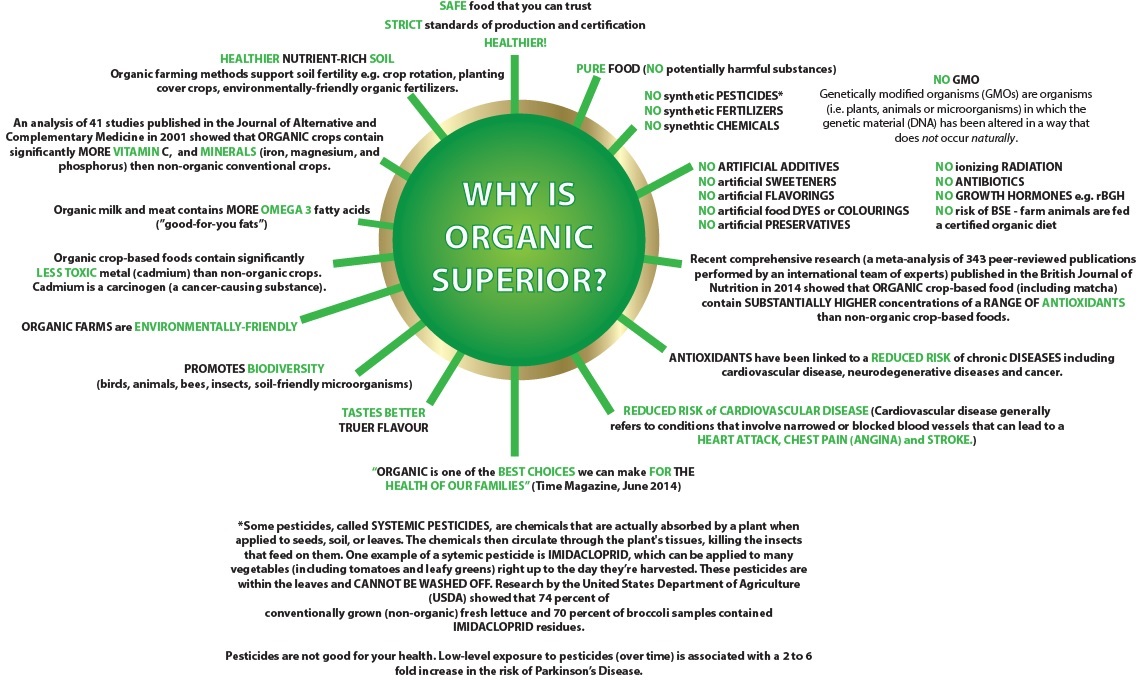
- ORGANIC food is safe food that you can trust, which is produced in environmentally-friendly organic farms. To be certified organic, products must be grown and manufactured in a manner that adheres to strict standards set by the country they are sold in.
- Organic food avoids artificial food additives - no artificial sweeteners, no artificial flavourings, no artificial food dyes and no artificial preservatives - as artificial food additives are banned from being added to organic food. Research indicates that some artificial food additives may increase risk of various diseases such as certain types of cancer (References are available on request). One means to lower the possible risk to health from artificial food additives is simply to avoid artificial food additives where possible. Choosing Organic Food as much as possible is a step in the right direction.
- Organic food aims to avoid synthetic pesticides and synthetic chemicals. Recent research at the University of California, Los Angeles, indicates that low level exposure to some synthetic pesticides and synthetic fungicides is associated with a 2 to 6 fold increase in the risk of Parkinson's Disease. The research also indicates that as the level of exposure to pesticides increases, the risk of developing Parkinson's Disease increases (Fitzmaurice et al., 2014). One means to lower the risk to health from pesticide exposure is simply to avoid pesticide exposure where possible. Choosing organic food as much as possible is a step in the right direction.
- Organic food is minimally processed.
- Organic food is superior quality food. Recent comprehensive research (a meta-analysis of 343 peer-reviewed publications performed by an international team of experts) published in the British Journal of Nutrition showed "statistically significant and meaningful differences in composition between organic and non-organic crops/crop-based foods.":
- " Most importantly, the concentrations of a range of antioxidants were found to be substantially higher in organic crops/crop-based foods, with those of phenolic acids, flavanones, stilbenes, flavones, flavonols and anthocyanins being an estimated 19%, 69%, 28%, 26%, 50% and 51% higher, respectively. Many of these compounds have previously been linked to a reduced risk of chronic diseases, including CVD (cardiovascular disease) and neurodegenerative diseases and certain cancers, in dietary intervention and epidemiological studies."
- "Additionally, the frequency of occurrence of pesticide residues was found to be four times higher in conventional (non-organic) crops."
- "Non-organic crops also contained significantly higher concentrations of the toxic metal Cd (Cadmium)" (Baranski et al., 2014).
- For more information on "why organic" and the benefits of organic food, visit the Soil Association's website. You can click on the hyperlink button below to go the Soil Association's website:
3. How do I know if a product is organic?
Each organic certification body has its own logo and identifier code. Look for the logo and identifier code on the packaging. Here are some examples of symbols of organic certification bodies commonly found on packaging in the UK, EU and USA. The Soil Association Certification logo (which can be printed in any colour with permission from the Soil Association) for products that are certified organic is:
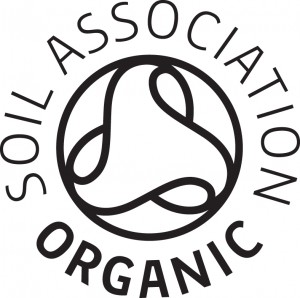
The new European Union (EU) logo for products that are certified organic is:

The United States Department of Agriculture (USDA) logo for products that are certified organic is:
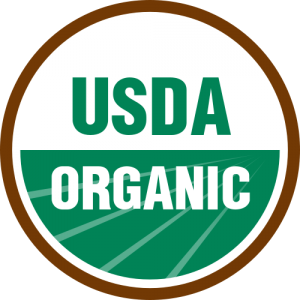
There are some bogus traders on the internet who claim in advertisements that they are selling "certified organic matcha" at extremely cheap prices that show images of certificates that are out of date or altered. There are also a few companies that use organic logos without authorisation from the relevant organic certification body.
If you have doubts about a company's claims that they are certified organic by a particular organic certification body, you could ask the company for their Organic Licence Number issued by the organic certification body and contact the relevant organic certification body and verify whether they have a licence or not. For the record, our company's Soil Association Organic Licence Number is DA22357.
The Soil Association has an excellent "Licensee Checker", which allows you to check whether or not a company has an organic licence with the Soil Association. For more information on "fraudulent certificates", visit the Soil Association's website. You can click on the hyperlink button below to go the Soil Association's website:
4. Why do you sell Japanese Matcha instead of Chinese matcha?
- LEAD CONTAMINATION is a serious cause for concern in CHINESE MATCHA. In my opinion, which is research-based, it is SENSIBLE to AVOID CONSUMING CHINESE MATCHA until you are certain that the leaves used to make the matcha are safe in terms of lead levels within the leaves. Lead has also been found in organic green tea from China. Therefore, the only way to prove that the Chinese Matcha is safe is by means of a laboratory report of analysis of the Chinese matcha for lead. To cut a long story short, lead can affect and damage any organ in the body. For example, lead can damage the heart, kidneys, reproductive organs (e.g. damaging sperm or a developing foetus in the womb) and the nervous system (e.g. damaging the brain). The brain is the most sensitive organ in the body to lead exposure. The amount of damage increases with the level of lead in the person's blood and the duration of lead exposure (the most important reference has copyright restrictions including citation; Han et al., 2006; Huh et al., 1999; other references are available on request). To read the research paper by Han et al of the Key Laboratory of Tea Chemical Engineering of the Ministry of Agriculture, Tea Research Institute & Chinese Academy of Agricultural Sciences, type "Scale and Causes of Lead Contamination in Chinese Tea" into your search engine. Doctor King® Finest Ceremonial Grade Organic Japanese Matcha has been tested for lead in Japan. The laboratory reported that lead was "NOT DETECTED". A copy of the report has been sent to the Soil Association.
- In addition, there have been worrying reports indicating that some TEAS FROM CHINA may NOT be SAFE to drink due to the presence of one or more illegal, harmful PESTICIDES (which are BANNED FROM USE BY TEA FARMERS in the Stockholm Convention). The synthetic pesticides endosulfan and monocrotophos can be acutely (and chronically) toxic to humans. To read the report by Greenpeace, type "Pesticides: Hidden Ingredients in Chinese Teas" into your search engine.


- Research at the University of Colorado Colorado Springs indicates that JAPANESE Matcha contains a phenomenal 137 times the EGCG antioxidants of Starbucks® China Green Tips Green Tea (Weiss et al., 2003)!
- In general, during matcha green tea manufacture in China, the fresh tea leaves from the Camellia Sinensis plants are pan-fried (to prevent oxidation), which damages some of the heat-sensitive EGCG antioxidants and L-theanine. Matcha Green Tea manufacture in Japan involves gentle steaming (to prevent oxidation), which occurs at a lower temperature and, therefore, preserves more of the important heat-sensitive micronutrients (References are available on request).
- Japanese organic standards are high and equivalent to UK, EU and US organic standards.
- Japan has the perfect climate and conditions for the plants.
5. Is the DOCTOR KING® brand of Organic Japanese Matcha Green Tea safe to drink (in terms of radiation)?
Yes, DOCTOR KING® products are perfectly safe to drink. We have an up-to-date certificate from a laboratory in Japan called Shin Nihon Kentei Kyokai (which is licensed by the Japanese government), which certifies that gamma ray spectrometry shows that gamma radiation was "not detected" from samples of the DOCTOR KING brand of Organic Japanese Matcha Green Tea (Finest, Premium and Culinary Grades) that were sent to the laboratory by the manufacturer. The laboratory analysed specifically for gamma radiation from Caesium-137, Caesium-134 and Iodine-131. Therefore, we would like to reassure our customers that DOCTOR KING® products are perfectly safe to drink.
6. Is Doctor King® matcha freshly-made?
Yes. Our matcha is freshly-made in Japan every month! Furthermore, our products are foil-packed for extra freshness. Our products are transported to the UK and USA by express air freight (not cheaper slow sea freight) to ensure that the matcha reaches our customers quickly. At our facility, we refrigerate the matcha to keep the matcha at its best.
7. Why does Finest Ceremonial Grade Organic Japanese Matcha cost more than regular green or black tea? Is matcha green tea worth it?
There are a number of reasons why Finest Ceremonial Grade Organic Japanese Matcha Green Tea costs more than ordinary tea. Here are some of the reasons:
1. Finest Ceremonial Grade Organic Japanese Matcha Green Tea is very high quality and very nutritious green tea. Ceremonial Grade Organic Japanese Matcha Green Tea has been described as the 'King of Green Teas'. It may be the world's finest green tea.
2. Shading the tea plants for three to four weeks requires special covers to be applied during cultivation, which requires time and paid workers to do this. Shading is not part of the process of making regular green tea.
3. Most farmers pick the finest leaves entirely by hand, which requires time and paid workers to do this.
4. At the factory, production requires meticulous destemming and deveining of the leaves (to obtain the most nutritious part of the leaves) and special granite stone-grinding to produce matcha. Each stone grinder produces about 30-40 grams of matcha in an hour. It takes a great deal of skill, time and effort by paid workers to produce matcha.
5. The Supreme/Finest Ceremonial Grade AAA Matcha costs approximately six times that of the lower grade organic Japanese matcha. One reason for this is that the Finest Ceremonial Grade AAA Organic Japanese Matcha contains the very best, youngest, sweetest leaves, which have been hand-picked and selected from the top of the Camellia Sinensis plant during the first harvest.
6. Our Organic Matcha arrives in Great Britain by express air freight (which costs far more than sea freight) to help ensure that our customers get matcha that is as fresh as possible.
7. Our products are further certified to UK standards by the largest organic certification body in the UK, Soil Association Certification (the organic licence costs over £1000 per year).
Hence, Supreme/Finest Ceremonial Grade Organic Japanese Matcha Green Tea costs more than regular green or black tea. Given that one serving of Japanese matcha green tea (one gram) is equivalent to 137 cups of China Green Tips green tea (in terms of the amount of antioxidants), you may have to buy and drink up to 137 cups of regular China Green Tips green tea to get similar benefit (in terms of antioxidants) to a one gram serving of matcha. Drinking so many cups of regular China Green Tips green tea would be impractical, more expensive and would result in caffeine intoxication ("caffeine jitters"). In my opinion, Organic Japanese Matcha is worth it. It is a GREAT INVESTMENT into YOUR HEALTH for the future. Superior quality costs more. I believe that Organic Japanese Matcha Green Tea is worth it.
8. Are there any cautions?
Our brand of Finest Ceremonial Grade and Premium Grade Organic Japanese Matcha Green Tea are safe healthy teas for almost everybody to enjoy. Matcha green tea contains caffeine. Typical values are 32mg of caffeine per one gram serving of Matcha Green Tea. Matcha Green Tea is low in caffeine relative to a cup of coffee. The Food Standards Agency recommendation is that "children, or other people sensitive to caffeine, should only consume caffeine in moderation. Pregnant women are advised not to have more than 200mg of caffeine a day". If you have any concerns, consult your doctor/physician before use.
9. What is the serving size for adults? How do you make matcha?
- The serving size for adults is one gram. You can adjust the quantity of matcha to taste (according to personal liking).
- The recipe for making a cup of perfect matcha tea is detailed on the back of the product packets or on the gift/presentation boxes.
10. How often should I drink Organic Japanese matcha?
- At least once cup of matcha tea a day, every day (as part of a healthy diet and lifestyle). However, you can enjoy drinking matcha more frequently if you wish.
- 1 gram of organic Japanese matcha per day or 1 gram of organic Japanese matcha twice a day is perfect.




